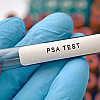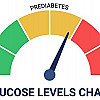Is there finally a way to measure tinnitus?
Harvard scientists say they've discovered a novel way to assess this distressing, mysterious condition.
- Reviewed by Anthony L. Komaroff, MD, Editor in Chief, Harvard Health Letter; Editorial Advisory Board Member, Harvard Health Publishing
 When someone has tinnitus — a phantom ringing, whooshing, or buzzing sound in the ear — doctors usually have to take the person’s word for it. While fancy tests can show if the brain’s hearing sensors are in high gear (a potential sign of tinnitus) there’s no way to detect the actual sound or intensity of the disorder.
When someone has tinnitus — a phantom ringing, whooshing, or buzzing sound in the ear — doctors usually have to take the person’s word for it. While fancy tests can show if the brain’s hearing sensors are in high gear (a potential sign of tinnitus) there’s no way to detect the actual sound or intensity of the disorder.
That might be changing. Harvard researchers recently identified biomarkers that appear to capture tinnitus severity for the first time.
New evidence
Scientists recruited about 100 healthy people (ages 19 to 60) to take part in a unique tinnitus study. None of the participants had hearing loss, but about half said they had severe tinnitus or mild sound sensitivity (hyperacusis).
All participants underwent brain activity scans and filled out questionnaires on their general health and their tinnitus. Then they took part in something new: the researchers videotaped participants’ faces while they listened to pleasant, neutral, or unpleasant sounds. In particular, the researchers tracked subtle facial movements and dilation of the pupils. “We wanted to think about other brain regions that get input from sound, and turned to the ones that regulate stress,” says Daniel Polley, the study’s senior author and director of the Lauer Tinnitus Research Center at Harvard-affiliated Massachusetts Eye and Ear.
The results
People who didn’t have tinnitus had measurably different facial responses and pupil dilation only in response to un-pleasant sounds. In contrast, all sounds caused people with severe tinnitus or hyperacusis to have few facial movements (a “blunted” effect characteristic of tinnitus) and overdilated pupils. “Their sympathetic nervous systems were always in overdrive. Even harmless sounds were treated as possible threats,” Polley says.
The findings, when fed to a computer model, accurately predicted the severity of symptoms participants had re-ported on questionnaires.
What this means
If the findings are replicated in additional studies, it could mean that doctors might finally have an objective way to measure tinnitus severity. This could be useful in many ways, such as gauging whether tinnitus has gotten louder or softer and whether treatment is working.
“One thing I really like is that the biomarkers can be detected without incredibly expensive or invasive tests,” Polley says. “Ultimately we want to develop an open-access video-based platform, so other groups can use these measurements.”
What you can do
No matter how tinnitus is detected, ways to treat it are still limited. The following strategies might help.
Make tinnitus less annoying. You might be able to redirect negative thoughts and emotions about tinnitus with hypnosis, mindfulness, or cognitive behavioral therapy. Such approaches “are targeted at making the stress of tinnitus less important, so you’re better at coping with it,” Polley says.
Sound therapy. For some — but not all — people with tinnitus, masking the sounds might distract overactive brain cells. Sounds might come from a bedside sound machine or a wearable device.
Manage stress. Any type of meditation, such as mindfulness, yoga, or gardening, helps tamp down the body’s stress response and trigger the opposite effect, called the relaxation response — a well-studied phenomenon that reduces stress hormones (and, in turn, helps lower your heart rate, blood pressure, and breathing rate).
See your doctor. If you’ve self-diagnosed your tinnitus, it’s important to see your primary care provider or an ear, nose, and throat doctor (otolaryngologist). Tinnitus is thought to be caused by hearing loss and damage to auditory nerve fibers, even if you have normal hearing. But in some cases, tinnitus is caused by a cyst in the ear or a buildup of earwax. Treating these conditions can eliminate the phantom sound.
Join an online support group. Look for tinnitus groups on social media or through the American Tinnitus Association. You may pick up tips that work for other people, or at least feel empowered by camaraderie.
Image courtesy Massachusetts Eye and Ear
About the Author

Heidi Godman, Executive Editor, Harvard Health Letter
About the Reviewer

Anthony L. Komaroff, MD, Editor in Chief, Harvard Health Letter; Editorial Advisory Board Member, Harvard Health Publishing
Disclaimer:
As a service to our readers, Harvard Health Publishing provides access to our library of archived content. Please note the date of last review or update on all articles.
No content on this site, regardless of date, should ever be used as a substitute for direct medical advice from your doctor or other qualified clinician.
















